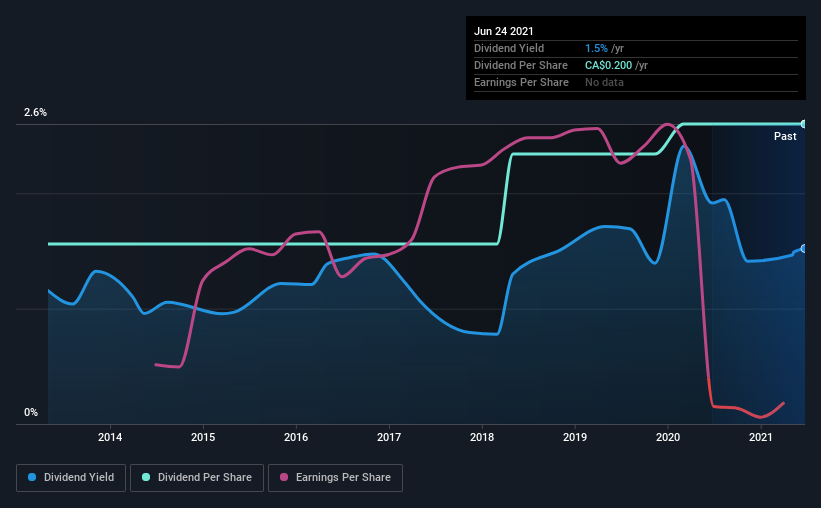Why It Might Not Make Sense To Buy Martinrea International Inc. (TSE:MRE) For Its Upcoming Dividend
Readers hoping to buy Martinrea International Inc. (TSE:MRE) for its dividend will need to make their move shortly, as the stock is about to trade ex-dividend. The ex-dividend date is one business day before the record date, which is the cut-off date for shareholders to be present on the company's books to be eligible for a dividend payment. It is important to be aware of the ex-dividend date because any trade on the stock needs to have been settled on or before the record date. Thus, you can purchase Martinrea International's shares before the 29th of June in order to receive the dividend, which the company will pay on the 15th of July.
The company's next dividend payment will be CA$0.05 per share, on the back of last year when the company paid a total of CA$0.20 to shareholders. Last year's total dividend payments show that Martinrea International has a trailing yield of 1.5% on the current share price of CA$13.15. If you buy this business for its dividend, you should have an idea of whether Martinrea International's dividend is reliable and sustainable. So we need to check whether the dividend payments are covered, and if earnings are growing.
See our latest analysis for Martinrea International
Dividends are typically paid out of company income, so if a company pays out more than it earned, its dividend is usually at a higher risk of being cut. Martinrea International's dividend is not well covered by earnings, as the company lost money last year. This is not a sustainable state of affairs, so it would be worth investigating if earnings are expected to recover. Considering the lack of profitability, we also need to check if the company generated enough cash flow to cover the dividend payment. If Martinrea International didn't generate enough cash to pay the dividend, then it must have either paid from cash in the bank or by borrowing money, neither of which is sustainable in the long term. Over the past year it paid out 128% of its free cash flow as dividends, which is uncomfortably high. We're curious about why the company paid out more cash than it generated last year, since this can be one of the early signs that a dividend may be unsustainable.
Click here to see the company's payout ratio, plus analyst estimates of its future dividends.
Have Earnings And Dividends Been Growing?
Businesses with shrinking earnings are tricky from a dividend perspective. Investors love dividends, so if earnings fall and the dividend is reduced, expect a stock to be sold off heavily at the same time. Martinrea International reported a loss last year, and the general trend suggests its earnings have also been declining in recent years, making us wonder if the dividend is at risk.
Another key way to measure a company's dividend prospects is by measuring its historical rate of dividend growth. In the past eight years, Martinrea International has increased its dividend at approximately 6.6% a year on average.
Remember, you can always get a snapshot of Martinrea International's financial health, by checking our visualisation of its financial health, here.
The Bottom Line
Should investors buy Martinrea International for the upcoming dividend? It's hard to get used to Martinrea International paying a dividend despite reporting a loss over the past year. Worse, the dividend was not well covered by cash flow. It's not an attractive combination from a dividend perspective, and we're inclined to pass on this one for the time being.
Although, if you're still interested in Martinrea International and want to know more, you'll find it very useful to know what risks this stock faces. Case in point: We've spotted 1 warning sign for Martinrea International you should be aware of.
We wouldn't recommend just buying the first dividend stock you see, though. Here's a list of interesting dividend stocks with a greater than 2% yield and an upcoming dividend.
This article by Simply Wall St is general in nature. It does not constitute a recommendation to buy or sell any stock, and does not take account of your objectives, or your financial situation. We aim to bring you long-term focused analysis driven by fundamental data. Note that our analysis may not factor in the latest price-sensitive company announcements or qualitative material. Simply Wall St has no position in any stocks mentioned.
Have feedback on this article? Concerned about the content? Get in touch with us directly. Alternatively, email editorial-team (at) simplywallst.com.

